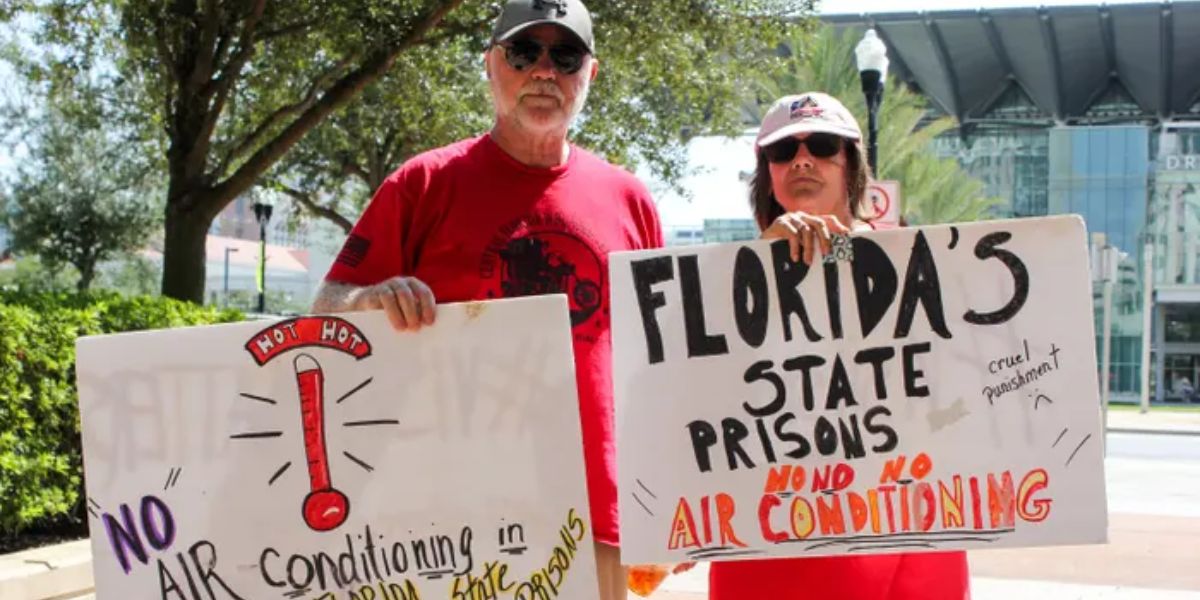Allegations Rise as Texas Inmates Face ‘Oven-like’ Jail Temperatures
April marks the start of scorching weather throughout much of Texas. While the summer heat is difficult for many, it may be fatal for those jailed in Texas’ prison system, where temperatures routinely approach triple digits. With another hot summer on the way, prison rights groups filed a complaint on Monday against Texas Department of Criminal Justice executive director Bryan Collier, claiming that the lack of air conditioning in the majority of Texas jails constitutes cruel and unusual punishment.
Four charity organizations joined the complaint, which was first filed last August by Bernie Tiede, an inmate who had a medical crisis after being kept in a Huntsville cell with temperatures topping 110 degrees. Tiede, a well-known offender whose 1996 murder of a wealthy widow inspired the film “Bernie,” has been relocated to an air-conditioned cell by a court order, although he is not assured of staying there this year.
Monday’s filing broadens the plaintiffs to include all convicts confined in uncooled Texas jails, which have resulted in the deaths of dozens of inmates and cost the state millions of dollars in wrongful death and civil rights cases.
The plaintiffs are requesting that an Austin federal judge rule the state’s prison policy illegal and order that prisons be kept below 85 degrees Fahrenheit. Texas jails are already mandated to maintain their buildings colder than 85 degrees, while federal prisons in Texas have a maximum temperature of 76 degrees.
The average temperature between June and August last year was 85.3 degrees, the second highest on record after 2011. And this year doesn’t appear to be much cooler. The most recent winter season was the warmest on record for the contiguous United States, according to the National Oceanic and Atmospheric Administration.
Scientists discovered that climate change has caused more severe and long-lasting heat waves. In the recent decade, Texas has had almost 1,000 days of record-breaking heat, compared to a normal decade. During a Monday press conference, recently incarcerated Texans stated that in the sweltering summer months, those concrete and metal cells may reach temperatures of more than 130 degrees. Legal representatives want to show that those conditions are unconstitutional.
“What is truly infuriating is the failure to acknowledge that everyone in the system —all 130,000 prisoners— are at direct risk of being impacted by something that has a simple solution that has been around since the 1930s, and that is air conditioning,” Jeff Edwards, the attorney for the convicts, told reporters.
Edwards was the primary attorney in a 2014 prison rights complaint that highlighted the almost two dozen Texas jail inmates who died of heat stroke over the previous two decades. The case concluded in a settlement in which TDCJ agreed to install air conditioning at the Wallace Pack Unit near College Station.
Approximately two-thirds of the inmates imprisoned at TDCJ facilities live in regions without air conditioning. Advocates and inmates’ families have long battled to cool jails in a state where summer temperatures often surpass triple digits, endangering inmates and correctional officials.
Although the state has not documented heat-related mortality since 2012, experts and inmates’ relatives question the numbers. A 2022 study discovered that 14 jail deaths per year were caused by heat. Last year, a Texas Tribune investigation revealed that at least 41 inmates perished in uncooled prisons during the state’s record-breaking heat wave.
Renal disorders, cardiovascular mortality, respiratory infections, and suicides have all been connected to high temperatures, according to Julie Skarha, an epidemiology researcher at Brown University who co-authored the 2022 study.
Skarha stated that, while death certificates may not specify heat strokes — a condition in which the body’s temperature cannot be controlled — as the official cause of death, her study shows that many prisoners have died as a result of heat. “Heat deaths haven’t magically stopped,” the complaint says. “TDCJ has simply stopped reporting or admitting them after the multiple wrongful death lawsuits and national news coverage.”
TDCJ spokesperson Amanda Hernandez declined to comment on the case, stating that the agency does not comment on active litigation. However, she underlined that the agency has been adding more air conditioning units since 2018.
“Each year we’ve been working to add cool beds, and we’ll continue to do so,” she went on to say.
She also mentioned the departments’ “enhanced heating protocols,” which are in effect from April to October and include delivering ice water to inmates and letting them purchase fans and cooling cloths from the commissary.
Lawyers claim that these mitigating measures are insufficient to address the state’s extreme temperatures. According to the lawsuit, jailed inmates have reported flooding their toilets or sinks and lying down in the water on the cell floor to cool their bodies.
“This isn’t an unpredictable event,” said Erica Grossman, one of the plaintiffs’ attorneys. “It gets hot every summer, and much like every other building in Texas —including buildings that have animals — we cool the building.”
The heat has a comparable effect on TDCJ workers who work in the facility, according to Michele Deitch, a senior lecturer at the University of Texas at Austin’s School of Law and LBJ School. The severe heat infiltrates all elements of prison life: staff must perform physical labor in heavy uniforms in the heat; the heat causes more violence among those confined; and it leads to more use of force against convicts, she said.
The TDCJ’s heat mitigation policies specify that employees are “encouraged to increase their water intake” during the hot summer months and are permitted to use cooling towels and dri-fit compression shirts. According to new research conducted by Skarha, the number of assaults in jails without air conditioning increased by up to five times during the summer months when compared to climate-controlled facilities.
According to jail rights groups, the state could easily afford air conditioning equipment in all of its prisons but has chosen not to. During the past legislative session, when the state had a record surplus, the House recommended spending $545 million to install air conditioning in the majority of jail facilities that lacked it. However, no funds were set aside for air conditioning in the final budget.
The House also passed a bill requiring prisons to maintain temperatures between 65 and 85 degrees Fahrenheit, as is already required in jails and most federal facilities. However, the bill failed in the more conservative Senate.
“We have the resources.” “We just don’t seem to have the compassion to do it,” Rep. Carl Sherman, D-DeSoto, said during the press conference. Sherman was one of the bill’s authors, who proposed regulating prison temperatures.
The Legislature did provide about $85 million for “additional deferred maintenance projects” in Texas jails, which TDCJ is utilizing to pay for air conditioning systems. Hernandez said that those funds could provide air conditioning for an estimated 10,000 convicts.









